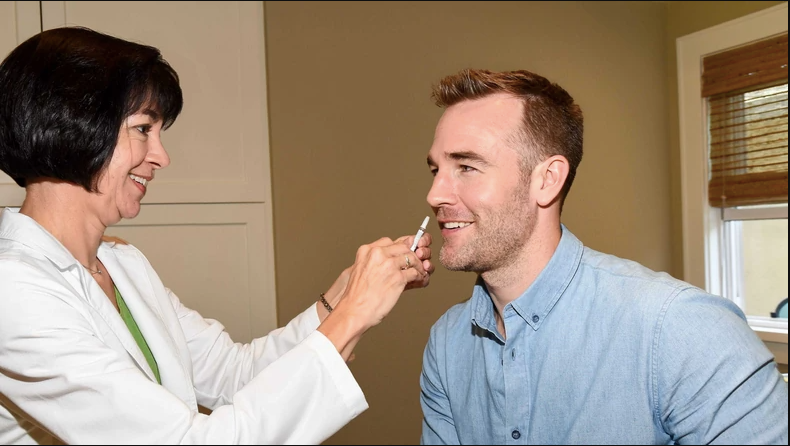A future COVID-19 vaccine could be squirted up the nose. The nasal spray could stop transmission.
- AYLIN WOODWARD,ALLISON DEANGELIS
- Mar 5, 2021
- 4 min read
Updated: Jul 2, 2022

US-based company Altimmune is developing a COVID-19 vaccine candidate that gets sprayed up the nose.
Such intranasal vaccines may reduce coronavirus transmission better than shots do.
COVID-19 boosters designed to combat variants could also be delivered intranasally, experts say.
Visit the Business section of Insider for more stories.
It's an intuitive idea: Wouldn't it be best to administer a COVID-19 vaccine in the place it first invades the body?
That's what Maryland-based biotech startup, Altimmune, is trying to develop - a COVID-19 vaccine that gets squirted into your nose, not jabbed in your arm.
Delivering vaccines to the sight of first exposure is an advantage, Dr Buddy Creech, who directs the Vanderbilt University vaccine research program and has worked with Altimmune, told Insider. "Typically, you don't get COVID-19 in the deltoid muscle of your arm, you get it in your nose, eyes, and throat. So it makes sense we'd want to at least consider a vaccine that can generate some immunity in mucosal orifices."
The three COVID-19 vaccines authorized in the US, of course, are all shots. Although they appear to curb transmission, it's unlikely they stop it all together. An intranasal vaccine, however, could create an extra line of defense, since it would prompt the immune system to produce antibodies that block infection locally in the mucous membranes of your nose and throat. That would prevent transmission by stopping viral shedding from those orifices.
Altimmune launched an 180-person trial of its intranasal vaccine, called AdCOVID, last month to test how safe the vaccine is, what side effects it prompts, and what levels of antibodies and T-cells it produces. Participants range in age from 18 to 55. The company expects to have data in the second quarter of this year.
Altimmune's COVID-19 vaccine candidate, AdCOVID, is designed to be given as a spray into the nostrils, courtesy of Altimmune.
Scot Roberts, chief scientific officer at Altimmune, told Insider that the best-case scenario would be a rollout to adults at the end of this year or in early 2022.
A nasal spray could prevent viral shedding from noses and throats

An Altimmune employee examines a vial of intranasal COVID-19 vaccine. Courtesy of Altimmune COVID wouldn't be the first vaccine that doesn't require a needle. The polio vaccine was first swallowed as a pill, and the CDC has approved multiple nasal-spray flu vaccines.
Vaccines injected into the arm muscle, however, are most common. These prompt your immune system to start producing T-cells that remember the pathogen should it ever return, and antibodies that fight off the virus across your body - what's known as systemic immunity.
But those antibodies don't always flood into the mucous-covered surfaces of the nose and throat (where a respiratory virus likes to hang out) in large enough numbers to stop the virus from replicating in those locations.
A nasal spray, however, can prompt your immune system to create antibodies known as immunoglobulin A locally in your mucosal orifices, according to Dr. Paul Goepfert, director of the Alabama vaccine research clinic.
"It's possible that this would be much more efficient vaccine to reduce coronavirus spread," Goepfert told Insider.
Indeed, Altimmune found in a recent animal study that its intranasal COVID-19 vaccine prompted both systemic immunity and mucosal immunity. Two other animal studies found that an intranasal spray prevented infections while almost completely blocking coronavirus transmission.
Nasal sprays could serve as boosters to target coronavirus variants

A proliferation of coronavirus variants have raised concerns that existing vaccines will need to be reinforced via booster shots. Pfizer and Moderna are each testing new versions of their shots to combat such variants, but distributing them could be another enormous undertaking.
A key advantage of Altimmune's spray is that it doesn't require refrigeration and can be kept at room temperature for months.
"If we do need revaccinations or to top up immunity in the presence of a variant, this approach makes perfect sense," Roberts said.
According to Daniel Oran and Eric Topol, two COVID-19 researchers at the Scripps Research Translational Institute in California, intranasal vaccines could help in that process, since people might be able to self-administer them.
"Simply mailing someone a nasal spray is far more convenient than arranging for an in-person injection," they wrote in Scientific American on Monday.
The duo also pointed out that swapping a needle for a spray could encourage more people to get vaccinated in the first place.
Altimmune hopes to test its spray in children this year

Altimmune plans to test its intranasal vaccine in children and is talking to the Food and Drug Administration about how to formulate those pediatric trials. The company hopes to launch a trial among children while the drug is still being tested in adults.
None of the COVID-19 vaccines authorized in the US can be administered to children younger than 16, since the companies didn't include kids in their early trials.
"Kids don't get so sick, but they sure can spread the virus. So, this idea of mucosal immunity that blocks transmission is really a perfect fit for the pediatric population," Roberts said. "Clearly the FDA recognizes the need. We can't leave 70 million Americans on the side, unvaccinated."

Goepfert said developing a nasal-spray vaccine for children would be a win-win: It would stymie their capacity for transmission and make it easier to vaccinate them.
"Not having to stick somebody is particularly appealing for pediatricians," he said.




